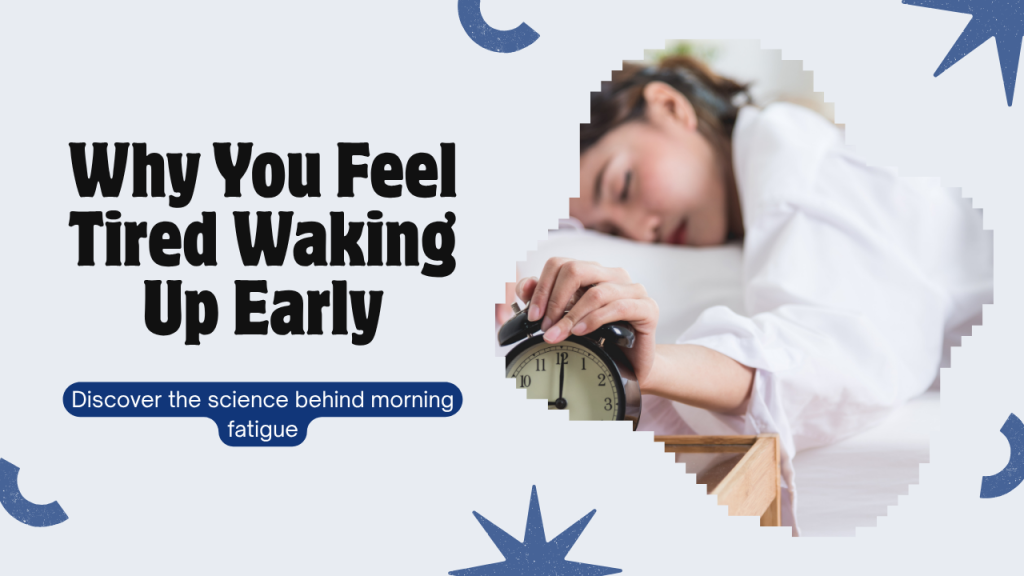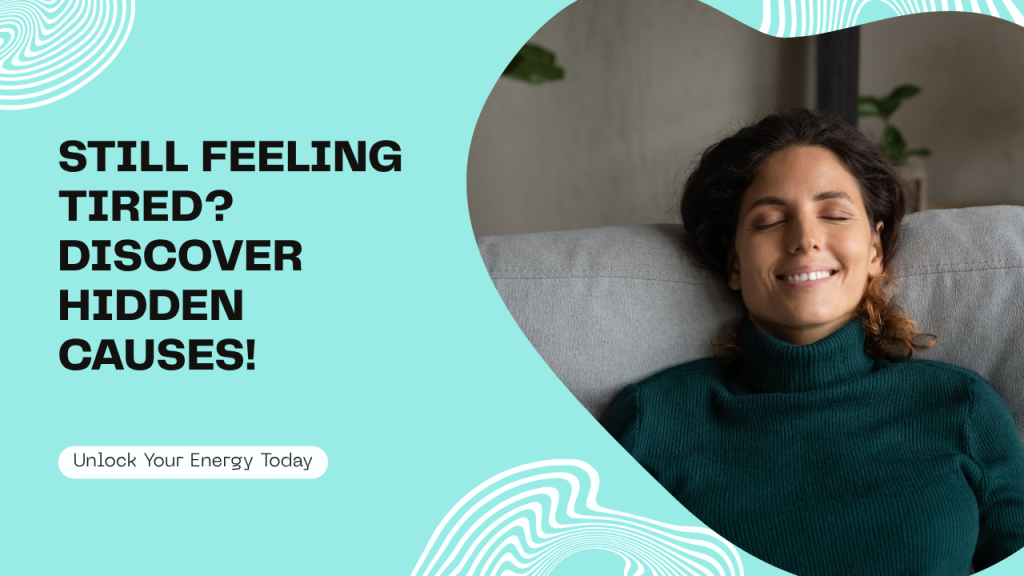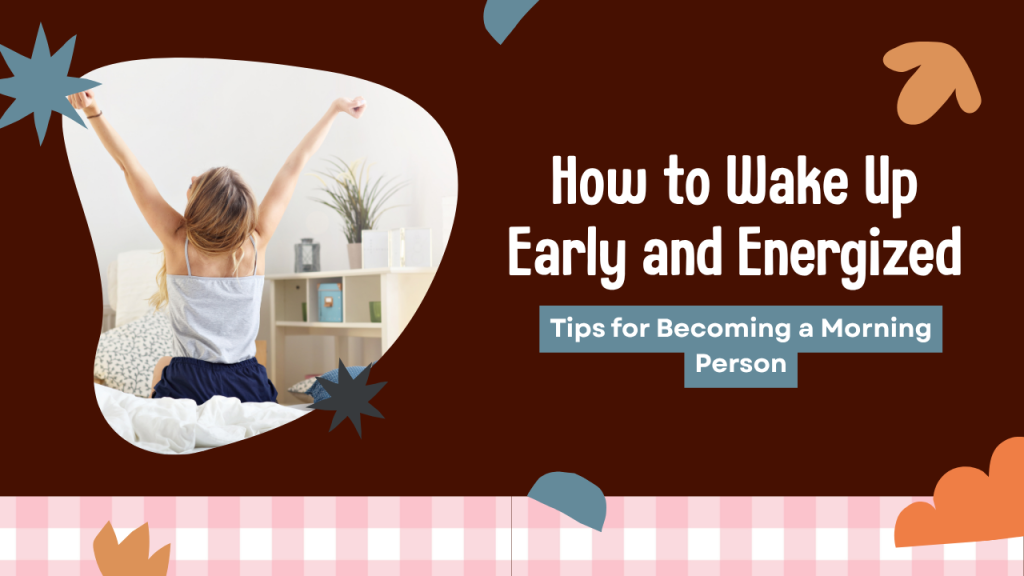Waking up early has long been celebrated as a secret weapon for success, productivity, and mental well-being. From CEOs who rise before dawn to athletes who hit the track while the world sleeps, the benefits of an early start are widely documented. Yet for many, the idea of waking up early without feeling tired seems nearly impossible.
Is it really achievable? The short answer: yes. But it takes more than setting an alarm clock. It requires understanding your body’s sleep needs, building sustainable habits, and optimizing your lifestyle.
This guide draws on evidence from sleep experts, neuroscience research, and proven daily routines to help you master the art of waking up early without feeling exhausted. Let’s dive in.

Why Do You Feel Tired When Waking Up Early?
Before we explore how to wake up early feeling refreshed, it’s important to understand why early rising often feels so difficult.
Your Sleep Debt Is Too High
Sleep debt accumulates when you consistently get less sleep than your body needs. If you require 8 hours but only get 6, after 5 days you’re already running a 10-hour sleep deficit. This catches up quickly, leading to morning grogginess.
Misaligned Circadian Rhythm
Your body runs on a 24-hour internal clock called the circadian rhythm. If you’re used to sleeping at midnight and suddenly start waking at 5 AM, your body still expects to be asleep. This misalignment makes you feel tired and sluggish.
Interrupted or Poor-Quality Sleep
Even if you’re in bed for 8 hours, disruptions (like waking up often, uncomfortable bedding, or sleep apnea) can prevent you from reaching restorative deep sleep stages.
Too Much Sleep Inertia
“Sleep inertia” is that heavy, foggy feeling upon waking. It’s most intense when you wake during deep (slow-wave) sleep. The timing of your alarm relative to your sleep cycles greatly influences this.
Benefits of Waking Up Early (With Proper Rest)
When done right, waking up early can supercharge your life:
Improved Mental Health: Studies link early rising to lower rates of depression and anxiety.
More Productivity: Morning hours are often free of distractions, letting you focus deeply.
Better Physical Health: Early risers often find it easier to exercise and maintain healthy routines.
Enhanced Sleep Quality: A consistent wake-up time stabilizes your circadian rhythm.
Peaceful “Me Time”: Quiet mornings offer moments for reading, journaling, or meditation.
But these benefits come only if you wake up early without chronic tiredness. Otherwise, you sacrifice cognitive function, mood, and long-term health.
How to Wake Up Early Without Feeling Tired: 12 Expert-Backed Strategies
Let’s explore exactly how to adjust your habits and environment to make waking up early feel natural and energizing.
1. Establish a Consistent Sleep Schedule
Your body thrives on routine. Going to bed and waking up at the same time each day trains your circadian rhythm to expect sleep and wakefulness at set times.
Tip:
Even on weekends, try to keep your wake time within 30–60 minutes of your weekday routine to avoid “social jetlag.”
2. Move Your Bedtime Earlier Gradually
Suddenly shifting from sleeping at midnight to 9:30 PM rarely works. Your body needs time to adapt.
How to do it:
- Move your bedtime 15 minutes earlier every few nights until you reach your target.
- Use dim lighting in the hour before bed to trigger melatonin release.
3. Get Bright Morning Light Exposure
Morning sunlight is the most powerful tool for setting your internal clock. Natural light tells your brain, “It’s time to be awake.”
Try this:
- Spend at least 15 minutes outside within 1 hour of waking.
- If natural light is scarce (during winter), use a 10,000-lux light therapy box.
This also helps you feel sleepy earlier at night.
4. Optimize Your Bedroom for Quality Sleep
Good sleep starts with the right environment.
- Keep it cool: 60-67°F (15-19°C) is ideal.
- Darken the room: Use blackout curtains or a sleep mask.
- Minimize noise: Try white noise machines or earplugs.
- Invest in comfort: A supportive mattress and breathable bedding make a huge difference.
5. Watch What (and When) You Eat and Drink
- Avoid heavy meals, spicy foods, and caffeine 4-6 hours before bed.
- Alcohol may make you drowsy initially but disrupts deep sleep later.
- A light snack with protein and carbs (like yogurt with berries) can help if you’re slightly hungry.
6. Create a Relaxing Night Routine
A predictable wind-down ritual signals to your brain that bedtime is near.
Try:
- Gentle stretches or light yoga
- Reading (paper books, not screens)
- Listening to calming music
- Deep breathing or progressive muscle relaxation
7. Limit Evening Screen Time
Blue light from phones, tablets, and computers suppresses melatonin production.
Solutions:
- Use “night mode” on devices.
- Install blue-light filtering apps.
- Stop screen use 60 minutes before bed.
8. Set a Smart Alarm or Use a Dawn Simulator
If you often wake in deep sleep, consider a sunrise alarm clock. It gradually increases light to wake you more naturally, reducing sleep inertia.
Apps like Sleep Cycle also track your movements and try to wake you during lighter sleep.
9. Place Your Alarm Across the Room
This forces you to physically get up, increasing blood flow and making it harder to crawl back into bed.
10. Have a Morning Plan You Look Forward To
Excitement is powerful motivation. Plan something enjoyable for the morning, such as:
- Brewing your favorite coffee
- Reading a novel for 20 minutes
- Doing a short sunrise walk
This positive anticipation makes getting out of bed easier.
11. Don’t Rely on Snooze
Each time you hit snooze, you restart a sleep cycle you can’t complete, often making you feel more groggy.
Try setting one alarm only. If you’re tempted, try the “5-second rule” (count 5-4-3-2-1, then stand up immediately).
12. Stay Consistent (Even If It’s Hard at First)
Your first week or two may still feel tough. That’s normal. It takes about 2–3 weeks for your body to fully adjust. Stick with it, and the process becomes automatic.

Bonus: If You Still Feel Tired, Check These Hidden Causes
Even with perfect habits, you might still struggle due to underlying issues such as:
- Sleep apnea: Loud snoring, gasping, or excessive daytime sleepiness may signal this condition.
- Restless legs syndrome: Tingling urges to move your legs at night can fragment sleep.
- Thyroid issues or anemia: Both can cause morning fatigue.
- High stress or depression: Mental health strongly impacts sleep quality.
If you suspect any of these, consult a healthcare provider.
FAQs: How to Wake Up Early Without Feeling Tired
Q: How many hours of sleep do I actually need?
Most adults need 7–9 hours. Genetics and lifestyle can vary this slightly.
Q: Can I become a morning person even if I’m a natural night owl?
Yes. Studies show that with consistent routine and morning light, you can shift your circadian rhythm. It may take longer—4–6 weeks—but it’s possible.
Q: What’s better: sleeping early or sleeping late if I get the same hours?
Generally, sleeping earlier aligns better with your natural melatonin rise and the earth’s light-dark cycle, leading to more restorative sleep.
Q: Should I take melatonin supplements?
Short-term, low-dose melatonin (0.5–1 mg) can help adjust your sleep phase. But use it with medical guidance, as timing matters.
Q: How long does it take to adjust to a new sleep schedule?
Usually 2–3 weeks for moderate changes. Bigger shifts (over 2 hours) may take over a month.
Conclusion: Yes, You Can Wake Up Early and Feel Great
Learning how to wake up early without feeling tired isn’t about forcing yourself to rise at 5 AM just because successful people do. It’s about understanding your body’s needs and building habits that align with natural rhythms.
By creating an environment that promotes restful sleep, honoring your need for enough hours in bed, and having something to look forward to in the morning, you’ll discover that early rising can be a joyful, productive part of your life.



